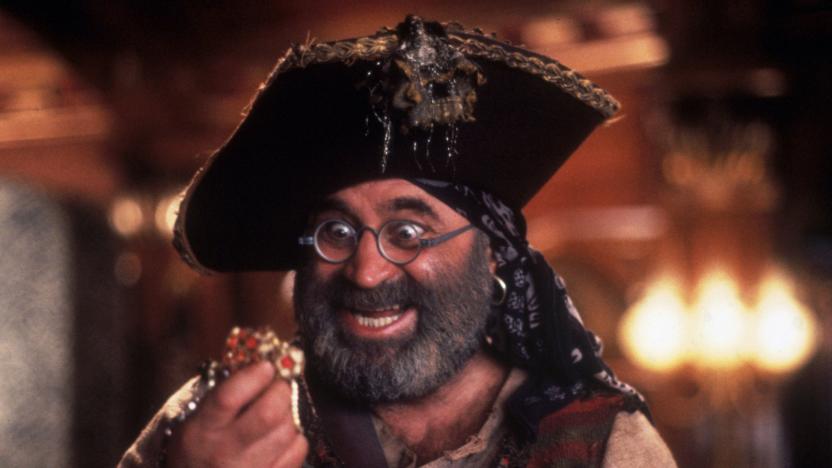copyright
Latest

Kodi boxes 'threaten to undermine' the UK's anti-piracy efforts
Media centre software Kodi is once again taking flak for its role in facilitating digital piracy today. An announcement from the UK's Intellectual Property Office (IPO) has praised "innovative" services like Netflix and Spotify for keeping Brits on the straight and narrow, but notes that the scale of online piracy remains "stable" -- which is just a positive way of saying no gains have been made in tackling infringement over the past 12 months, following several years of decline. While not mentioning Kodi specifically (which isn't unusual), the IPO states that "illicitly adapted set-top boxes" are partly to blame for this, and "threaten to undermine recent progress."

UK copyright body throws idle threats at Kodi box owners
Audio-visual enthusiasts know and recognise that Kodi is the swiss-army knife of media centres. But for lots of people around the world, the software is synonymous with movie and TV show piracy. "Fully-loaded" Kodi boxes have made the open-source platform a huge target for copyright authorities and rights holders, who are now using the courts to punish people who sell ready-made illegal streaming solutions. The end user has typically escaped punishment, but the Federation Against Copyright Theft (FACT) is now warning UK owners that they too could see the long arm of the law tap them on the shoulder.

Copyright troll lawyer is finally disbarred for fraud
While it is illegal to download copyrighted files from file-sharing sites, it is also against the law to extort downloaders. John L. Steele, a Chicago lawyer who pled guilty to perjury, fraud and money laundering resulting from alleged "honeypot" schemes, has just been disbarred by an Illinois court. Both Steele and his law partner, Paul Hasmeier, were indicted last March for uploading porn videos that they acquired through sham companies in the West Indies and then suing whomever downloaded them, resulting in a staggering $6 million in settlement fees. That's quite a honeypot.

China says Apple isn't cloning a local phone maker
Did it seem ridiculous to you that Beijing officials ordered a ban on the iPhone 6 and 6 Plus over a dubious design patent claim? You're not the only one. A court has reversed the ban (which was suspended during a dispute process) and declared that Apple isn't violating the patents of Shenzhen Baili Marketing Services, which insisted that the iPhone 6 riffed on the look of its 100c smartphone. Regulators issued the ban without real proof of wrongdoing, according to the ruling, and the iPhone has traits that "completely change the effect" of its design versus its (frankly very generic-looking) rival. Customers haven't had a problem telling the difference between the iPhone and 100c, the court says.

Nintendo wins a key case against a 3DS modchip seller
Nintendo is no stranger to cracking down on companies that sell tools enabling pirated games on its consoles. However, its latest victory might be more important than most. The company has won a copyright case in Canada that accused Go Cyber Shopping (GCS) and its founder, Jeramie King, of illegally selling 3DS flashcarts, modchips and other piracy-oriented tools. While Nintendo would likely be happy enough with that triumph, it notes that this is the first case "of its kind" to test the Canadian Copyright Act's anti-circumvention measures -- think of it as a rough parallel to aspects of the Digital Millennium Copyright Act in the US.

Google and Microsoft agree to demote pirate search results
The UK government has drawn up a 'Voluntary Code of Practice' designed to demote search results for copyright-infringing websites. The new guidelines, which come into effect immediately, have been signed by Google, Bing, the Motion Picture Association and the British Phonographic Industry (BPI). They formalise and "accelerate" the process by which a rights holder can flag what it perceives to be a site containing illegal content. If the request is upheld, the link will be removed from "the first page of search results," according to the UK's Intellectual Property Office.

Is the UK's new piracy email alert program dead on arrival?
All of the UK's major internet service providers have just embarked on a new project aimed at curbing digital piracy. As part of a bigger campaign to promote legal sources of media, spearheaded by copyright holders and the UK government, ISPs have signed up to the Voluntary Copyright Alert Programme. Under this, providers have agreed to send warning emails to subscribers when their IP address has been implicated in illegal file-sharing. Rather than being threatening, these emails are intended to be educational, informing people of what's happening on their connection and pointing them towards all the legal ways they can watch the latest DVD releases. There's just one problem: It doesn't work.

US internet providers stop sending piracy warnings
Remember the media industry's vaunted Copyright Alert System? It was supposed to spook pirates by having their internet providers send violation notices, with the threat of penalties like throttling. However, it hasn't exactly panned out. ISPs and media groups have dropped the alert system with an admission that it isn't up to the job. While the program was supposedly successful in "educating" the public on legal music and video options, the MPAA states that it just couldn't handle the "hard-core repeat infringer problem" -- there wasn't much to deter bootleggers.

'Fully loaded' Kodi box seller pleads not guilty
Whether the makers of Kodi (by now you should know that's the new name for what used to be XBMC) like it or (definitely) do not, people have built businesses around preloading their software on players like a Fire TV stick and advertising it as an avenue for watching pirated video streams. Over in the UK, the authorities raided Brian Thompson's Cut Price Tomo TV's and have charged him with two offenses under the Copyright, Designs and Patents Act. Now, as TorrentFreak explains, the court will decide what role Thompson played in any potential copyright infringement by the people who purchased the devices.

CBS and Paramount settle lawsuit with 'Star Trek' fan film
It's been a wild ride for the folks behind the Axanar Star Trek fan film, but it's finally over -- the fan production group has settled its lawsuit with CBS and Paramount. The terms of the agreement aren't completely clear, but both parties have announced that the deal will allow Axanar productions to finish and release its fan film for free as long as a certain number of undisclosed "substantial changes" are made. Even better? According to Ars Technica, the settlement doesn't require the fan group to pay damages, either.

UK ISPs will soon send written warnings to suspected pirates
UK ISPs will begin sending out emails to subscribers later this month, warning them of movie, TV and music piracy identified on their connection and pointing them to legal content sources. All four major providers -- Sky, BT, Virgin Media and TalkTalk -- have agreed to the Voluntary Copyright Alert Programme, an anti-piracy initiative that's been in the works since the summer of 2014. It's the active component of Creative Content UK, a partnership between copyright holders, the government and ISPs that aims to combat digital piracy in an educational, non-threatening way.

'Star Trek' fan film loses fair use case, moves to jury trial
It's been a long journey for the makers Axanar, the crowdfunded Star Trek fan film that ran afoul of CBS and Paramont's lawyers. After successfully raising over a million dollars to to create a professional-grade homage to the Star Trek brand, Axanar's producers were hit with a lawsuit, assured that lawsuit would be dropped, and then taken to court. The filmmakers stood their ground and argued a case of fair use, but ultimately lost. Today, U.S. District Court Judged Gary Klausner ruled that Axanar is just too faithful to Star Trek canon to avoid copyright infringement.

Facebook is building a tool to hunt copyright infringing videos
YouTube isn't the only site record labels are taking issue with when it comes to copyright infringement. Financial Times reports that music publishers want Facebook to license music that gets posted on its site and take down any user-submitted videos that contain copyrighted content. The first step is said to be handling all the copyrighted material that's posted to the site's News Feed in the form of cover songs and other footage. As part of the effort, Facebook is said to be working on a copyright identification system, similar to YouTube's Content ID, to help police what's published.

SoundCloud won't take down DJ mixes
SoundCloud made its name partly on the back of DJ mixes (both official and otherwise), but you could never take their presence for granted. All it would take is an overeager copyright lawyer and your favorite set would disappear in a puff of digital smoke. That shouldn't be a problem going forward, though. Company co-founder Eric Wahlforss tells Germany's Groove that it's now possible to upload mixes "problem-free." The rights negotiations for SoundCloud Go made all the difference, Wahlforss says -- agreements with copyright holders mean that there won't be any rude legal surprises, whether or not you're a Go subscriber.

YouTube deal ends years-long fight over music videos in Germany
German music fans haven't had it easy in the past 7 years. A royalty dispute with music rights group GEMA has forced YouTube to block thousands of music videos in the country, leaving locals no choice but to either find alternative video sources or (gasp) settle for audio alone. At last, though, they can relax: GEMA and YouTube have reached a deal that makes sure GEMA members get paid for video streams. The exact terms of the deal aren't public, but it'll cover both the usual ad-supported free viewing as well as the eventual European launch of YouTube Red subscriptions.

Cisco says it can cut live pirate video streams
It's relatively easy for content providers to take down pirated videos when they're uploaded to the web, but stopping live streams is another matter. Just ask anyone who has watched a bootleg stream for a pay-per-view boxing match or the Super Bowl -- new streams usually pop up faster than the copyright holders can take them down. The party might soon be over, however. Cisco has created a new technology, Streaming Piracy Prevention, that promises to automatically cut off illegal live feeds.

EU digital rules promise 5G, free WiFi and tougher copyright
The European Union isn't done stepping up its digital initiatives. Officials have outlined proposed policies that are focused on dramatically increasing access to both the internet and the content you'll find on it. Most of the proposals will be helpful, although not everyone is a fan -- there are copyright changes that are rubbing Google the wrong way.

De La Soul's samples are why its classic albums stay offline
Have you wondered why De La Soul is more than happy to offer its newer albums online, but has had so much trouble getting its classics (Stakes Is High and earlier) online that it gave them away at one point? You now have a good, if imperfect, explanation. Their label, Warner Music Group, tells the New York Times that its staff "don't believe it is possible" to clear all the samples in early tracks for digital music services. It doesn't explain why those samples are being held back, but the group's current sample clearance agent suspects that many of those samples may have been cleared improperly, sometimes through informal agreements. It's also possible that many of the sample deals didn't account for non-physical releases, so Warner might have to start from scratch.

Google defends its anti-piracy efforts
If you believe Trent Reznor and a good chunk of the music industry, Google (particularly YouTube) is a giant piracy machine -- it's allegedly doing little to block stolen content, and knowingly profits from it. Google isn't having any of that talk, though. The search firm just published an updated report detailing its anti-piracy efforts, and it maintains that it's doing a lot to fight bootleggers. It's adamant that its Content ID system (which can automatically claim copyrighted material for licensing or takedowns) does wonders for the media business. The technology has paid over $2 billion to copyright owners since launch, and about 98 percent of copyright action uses it -- just 2 percent comes down to formal copyright removal notices.

Blizzard sues an 'Overwatch' cheat developer
Blizzard has about as much interest in stamping out cheaters as you do, and it's willing to go to court to keep things clean. The company has filed a US lawsuit against Bossland, a German developer whose Watchover Tyrant app is designed solely to help unscrupulous Overwatch players. The software allegedly violates copyright law, including the Digital Millennium Copyright Act's anti-circumvention measures. More importantly, Blizzard claims that Watchover hurts both legitimate players and the bottom line. The developer may be losing "tens of millions of dollars" in sales to gamers put off by the thought that cheaters are running rampant.







